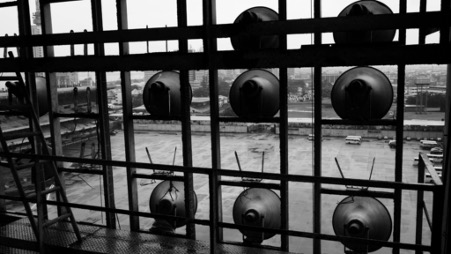
Emeka Ogboh, Tafawa Balewa Square, photo credit: Emeka Ogboh
Courtesy of 14thMay Studio
Born Enugu, Nigeria (1977), lives and works in Berlin, Germany and Lagos, Nigeria
’64’ (Beer) 2024
aluminium can, beer
12.2 cm x 6.62 cm
Courtesy of the artist & Bature brewery
The Ambivalence of 1960 2012/2024
audio
Courtesy of the artist and Chief (Dr.) Moses Adekoyejo Majekodunmi Foundation
Commissioned by Lagos Biennial 2024
Artist’s statement
’64’ (Beer)
The ‘64’ craft beer project merges brewing with a cultural exploration of Nigeria’s 64-year independence history. It begins with a public invitation to describe Nigeria in a flavour, capturing diverse national perspectives and personal stories. This feedback is crucial in creating ‘64’, a beer that represents the Nigerian experience, developed in collaboration with Bature Brewery. The project transcends traditional brewing, intertwining public participation, cultural expression, and brewing craftsmanship. The final product, ‘64’, is more than a drink; it’s a storytelling medium, with a reflective can design encouraging personal reflection and connection to Nigeria’s story. This innovative approach turns craft beer into a narrative of Nigeria’s history, inviting drinkers to not only taste but also experience and contemplate the nation’s journey.
The Ambivalence of 1960
The Ambivalence of 1960 is an evocative art installation set in the historic Tafawa Balewa Square in Lagos, where Nigeria’s Independence was first celebrated. This project seeks to capture the duality of emotions and perspectives surrounding the year 1960 – a landmark year that symbolised both the triumph of independence and the beginning of complex challenges for Nigeria.
Rooted in the notion of ambivalence, the installation explores the dichotomy of joy and apprehension, pride and uncertainty that characterised Nigeria’s emergence as an independent nation. It invites reflection on the multifaceted legacy of 1960, examining both the euphoria of freedom and the subsequent struggles and unrealized dreams of the nation.
Utilising the original audio of Prime Minister Tafawa Balewa’s Independence speech, the installation will recreate the auditory experience of 1960 through speakers positioned in the square. This arrangement serves to immerse visitors in the historic moment while simultaneously prompting them to consider the complex realities that followed.
By revisiting the speech in its original location, the project fosters a dialogue between the past and the present. It underscores the sense of achievement felt in 1960 while contrasting it with the subsequent trajectory of the nation, marked by both progress and challenges.
The installation is enhanced with ‘Designated Discussion Areas’ within Tafawa Balewa Square. These areas are equipped with seating and interactive materials, encouraging visitors to engage in guided conversations about the themes of ambivalence and Nigeria’s independence journey. These discussion circles will delve into a variety of topics, offering a space for collective reflection and understanding of the nation’s complex history.
The aim is to evoke a nuanced understanding of Nigeria’s journey since independence, acknowledging both the successes and the struggles. The Ambivalence of 1960 encourages a deeper engagement with Nigeria’s history, inviting visitors to grapple with the complexities of national identity and progress.
The installation not only commemorates a pivotal moment in Nigerian history but also serves as a platform for contemplation and conversation about the nation’s multifaceted journey. It’s an invitation to critically assess the legacy of 1960 and its implications for the present and future of Nigeria.
Emeka Ogboh’s work is included in Gregarious architectures.









